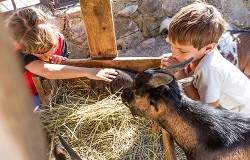Farms found to be right environment to strengthen children’s immune systems
The prevalence of allergies and asthma is increasing, with this tendency becoming more pronounced in industrialized countries over the last few decades. Currently, allergies are present in around a third of children, with the notable exception of children living on farms. Farms expose children to a wide range of microbes which protects them as the immune system can develop without it over-reacting to harmless substances, as happens with allergies. This phenomenon is borne out by the fact that children who live in the same village, but do not live on a farm, are developing the diseases at a faster rate than their farm-based contemporaries. The sialic acid protector However, recently published research in the The Journal of Allergy and Clinical Immunology has extended this knowledge even further. The published work which includes contributions from EU-funded projects EFRAIM, PARSIFAL and PREDICTA (now closed), demonstrated that beyond microbes, farm animals themselves also help strengthen children’s immune system, preventing allergies and asthma. As one of the authors, immunologist Remo Frei summarises, ‘Early childhood contact with animals and the consumption of food of animal origin seems to regulate the inflammatory reactions of the immune system.’ The study shows that a sialic acid, common in vertebrates, such as farm animals, is responsible for the protective phenomenon. Crucially, owing to a genetic mutation, the exact substance - N-Glycolylneuraminic acid (Neu5Gc) – is not naturally occurring in humans. However, Neu5Gc can be absorbed by humans through contact with animals or by eating food of animal origin, as it then becomes integrated into their glycoproteins. When coming in to contact with Neu5Gc, humans respond by generating antibodies and the researchers were able to measure antibody concentrations in the serum samples of children collected from two epidemiological EU-financed studies (PARSIFAL and PASTURE). This enabled the researchers to infer the absorption of the sialic acid. By looking at the cohort of over 1000 children the researchers could correlate incidences of asthma, against Neu5Gc antibody concentration. Frei concludes that, ‘Farm children have many more antibodies against Neu5Gc in their blood -- and children with more antibodies suffered considerably less from asthma.’ These results were further corroborated using a mouse-model, with the study fining that the Neu5Gc molecules, consumed through food, improved the pulmonary function of the mice, therefore reducing asthma symptoms. Out of the farm yard and into the pharmacy? To better understand the precise mechanism by which the human immune system is affected Neu5Gc, the team investigated various immune system cells implicated during an inflammatory reaction. Intriguingly, the study found that while Neu5Gc did not seem to reduce immunoglobulin E, the antibody associated with allergic reactions, it did appear to prompt an immune system anti-inflammatory reaction. This reaction is facilitated by the regulatory T-cells, which modulates excessive immune system responses, along with a strong anti-inflammatory effect. Allergies are increasingly becoming a major European health concern, with the onset starting in childhood and with no cure yet available. Thinking ahead to possible future applications Frei says, ‘Our research results open up opportunities for transferring the protective effect of farms to all children. In this way, we can possibly lay an important foundation stone for effective allergy prevention.’ For more information, please visit: EFRIAM Project website
Countries
Germany, Greece, Sweden



